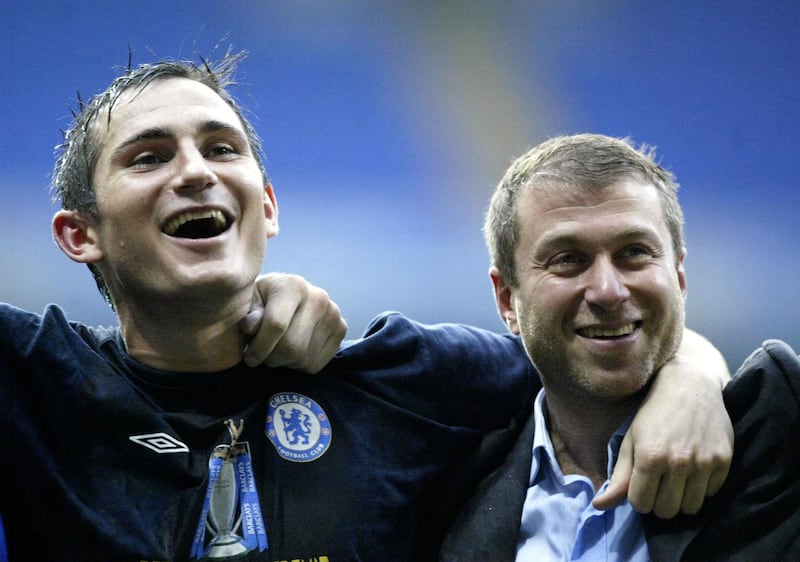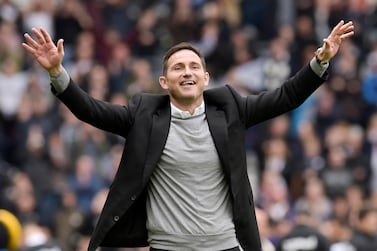Go back 14 months. Derby’s manager, Gary Rowett, had been poached by Stoke City.
As County looked for a replacement, Harry Redknapp, who had a brief spell at Pride Park as football advisor in 2016, rang the owner Mel Morris.
Talk to Frank Lampard, he suggested. It would not commit Morris to anything, but they ought to have a chat.
Morris followed that advice. Lampard’s eloquence made him a persuasive candidate. Derby appointed Redknapp’s former West Ham charge and nephew. Lampard’s second managerial role also owes something to friends in high places.
Over to you, boss! #WelcomeHomeFrank pic.twitter.com/vPGpCUSsMX
— Chelsea FC (@ChelseaFC) July 4, 2019
In 2005, Roman Abramovich lent his yacht, Pelorus, to Lampard for a couple of weeks; it was a different sort of bonus for winning Chelsea’s first league title in 50 years.
Now Abramovich has given an old ally a different kind of reward: the post of Chelsea manager. Newly 41, Lampard is the youngest Englishman to take charge of any of the current top six since Glenn Hoddle in 1993.
After a solitary season of coaching, he is arguably the least experienced candidate granted a top job in England since Liverpool appointed Kenny Dalglish in 1985.
Lampard’s swift rise has been propelled by his connections. It is also a consequence of his personality. Vincent Kompany, another hugely impressive character, described him as “the natural fit” for Chelsea.
A generation of multi-millionaire players are moving into management but Lampard looks the best equipped to succeed.
In a sense, he was the greatest overachiever of his age, a lesser talent who, through determination and relentless shooting, became the paragon of consistency who was voted the second best player in the world in 2005.
The footballer who famously got an A in his Latin GCSE was also recorded, according to former Chelsea doctor Bryan English, with an IQ over 150; Lampard put that intelligence and those analytical skills to excellent use in displays of extreme efficiency. He was both a product of Jose Mourinho and a self-made player.
Lampard the manager is evidently influenced by Mourinho: not the embittered figure of Old Trafford, but the galvanising force of Stamford Bridge. The Portuguese was 41 when first appointed. He forged a bond with his players.
The sight of Lampard at the centre of the Derby celebrations after their play-off semi-final win over Leeds United in May suggested a similar band of brothers.
Lampard’s post-match ploy of bouncing in front of the fans became a trademark and another way of engendering unity. The man-management of players and crowd are reminiscent of his mentor.
The faith in youth – the major successes of his season at Derby were the young loanees Fikayo Tomori, Mason Mount and Harry Wilson plus the teenage full-back Jayden Bogle – may not be, but gave him a sheen of progressiveness. He eschewed more conservative choices.
Lampard has been a thinker, even if it is a stretch to call him a philosopher. His preference has been for a Mourinho-esque 4-3-3, but he has shown a flexibility of thought.
He outwitted Leeds' Marcelo Bielsa with his use of a midfield diamond. Equally, the embryonic manager's decision-making has not been faultless: arguably, he selected the wrong side in Derby County's play-off final defeat to Aston Villa.
It goes without saying that none of the three managers who actually did secure promotion – Norwich’s Daniel Farke, Sheffield United’s Chris Wilder and Villa’s Dean Smith – would not have been considered by Chelsea.
Lampard’s past and his contacts, his understanding of the club, its fans, demands and life as an elite player, have helped grant him the chance.
He has been picked on potential and on personality, rather than actual achievements. Yet none of that means the nepotistic choice is necessarily the wrong one.







